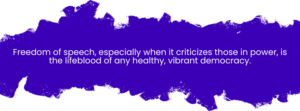Freedom of Speech is a ‘Roadblock’ to Government?
John Kerry’s recent description of the freedom of speech as a ‘roadblock’ to government efforts to eliminate dissent reflected the same misunderstanding of freedom and liberty that led the founding generation to include the First Amendment’s protections in the first place. To frame the act of speaking as the problem is to frame Kerry’s position as less about protecting liberties and more about giving the government more power to silence opposition. That should give any lover of democracy chills.
What History Tells Us Regarding Free Speech
History tells us exactly where this path will lead. Nazi Germany, the Soviet Union, and contemporary China are examples of totalitarian societies that have used the silencing of dissent and restrictions on speech to maintain a vice-like grip on power and control over their populations. In these systems, dissent was – and is – criminalized; debate was – and is – crushed; and those who dared to speak against the state encountered prison, exile, or even death. In Nazi Germany, for example, opposition was smothered by propaganda, arrest, and censorship, with the state’s control of public dialogue rationalizing all manner of atrocities. In the Soviet Union under Stalin, the government purged dissidents, and controlled the entirety of state-reported public dialogue through state propaganda. In China, speech that runs counter to the ruling Communist Party is censored, with individuals who post online criticism risking punishment.
What Kerry seemed to be recommending was rollback – the very slippery slope that has, historically, led us to totalitarianism. If Kerry were truly, as he said, ‘a big, big believer in freedom and liberty’, his position would be to defend the First Amendment, not to curtail it. If people have a constitutional right to express their dissent, that is not some grating glass in a conduit of government, it is the heart of the free society. The First Amendment came to be part of the Bill of Rights so that the government could never be all powerful and would instead be accountable to the people that it governed, not the other way around.
The First Amendment
The First Amendment, as was the rest of the Bill of Rights, was drafted as a check on centralized state power, not to give the state a mandate to gag speech, but to prevent the state from encroaching on individual liberties. It’s through freedom of speech that arguments can be aired, government actions can be criticized, policy can be challenged and none of them can be witch-hunted and punished by the incumbents for purposes of their own. The Constitution’s First Amendment isn’t a ‘roadblock’ to progress, as Kerry suggests, but a means for a free country to advance while holding its leadership accountable.
What is even more alarming is that Kerry’s statement reflects a desire for unbridled power in government – the very thing the Founding Fathers set out to avoid when they wrote the Constitution. In light of Kerry’s remarks, we ought to remember that liberty is not a privilege granted by the government but a right that Government must avoid infringing on.

However, totalitarian systems are based on the fundamental idea that dissent is the enemy of the state and must be eradicated to survive. The US, on the other hand, was founded on the very opposite principle: that dissent is the lifeblood of a democracy and must be fostered to ensure continued civil order. Parler is resolutely committed to the US Constitution and the First Amendment. Freedom of speech, especially when it criticizes those in power, is the lifeblood of any healthy, vibrant democracy. To call it anything but a ‘way forward’ is both inaccurate and demonstrates a fundamental misunderstanding of what real freedom means.
Why Parler Matters for Freedom of Speech
Kerry’s words remind us why platforms such as Parler matter: to ensure that speech is free, open, and unfettered by political pressure, no matter where it may go. Those guaranteed rights should not be threatened by those seeking greater control over public discourse.
For more information go to Politico and Bill of Rights Institute, respectively.
Log into Parler and let your voice be heard!


